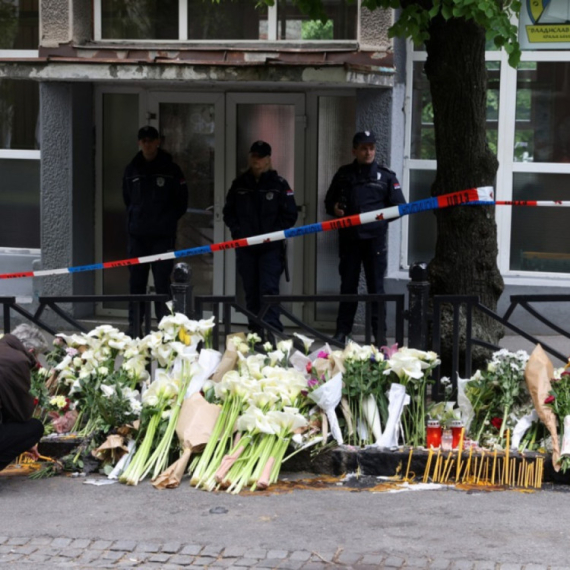Party officials offer different views on talks
The opposition Democratic Party (DS) has called on the Serbian government and president to continue the dialogue with Priština and try to reach a compromise.
Wednesday, 03.04.2013.
14:48

BELGRADE The opposition Democratic Party (DS) has called on the Serbian government and president to continue the dialogue with Pristina and try to reach a compromise. Another opposition party, the Democratic Party of Serbia (DSS), meanwhile believes the failure of Tuesday's round of dialogue in Brussels is "a light in the tunnel" and a chance for the country to regroup. Party officials offer different views on talks At a roundtable discussion entitled "What after April 2" organized by Tanjug on Wednesday in Belgrade, DS MP Bozidar Djelic said the outcome of the latest round of dialogue hurts not only the government but the entire country. The eighth round of talks in Brussels finished late Tuesday without an agreement, and EU High Representative for Foreign Affairs Catherine Ashton, who mediated the talks, said she considers them completed and expects Belgrade and Pristina to inform her what they have decided. Djelic said he cannot comment on Tuesday's talks because he has no information, noting it is high time government members and the president came to the parliament and informed the MPs about the real state of affairs. He said Serbia's economy is struggling, inflation and unemployment are high, the country borrowed an additional EUR 3.5 billion, and the current government has not brought in a single investor, and has therefore shown itself incapable of running the country. Slobodan Samardzic, DSS parliament whip, believes the failure of Tuesday's round of dialogue is "a light in the tunnel" through which Serbia has been stumbling for the past five years and a chance for the country to regroup and turn to a balanced Kosovo and European policy. Samardzic said the Kosovo issue will now have to be put aside for a bit when it comes to both the politicians and the public, as well as the ambitions of Pristina, Brussels and Berlin. "This is a chance for our country to regroup in terms of our strategy in this matter and perhaps open a new page in the foreseeable future," said Samardzic. "Another good thing is there will be no date (for the start of Serbia's accession talks with the EU) and this fiction that was dangled before us while solving the Kosovo issue. This is a great relief for Serbia and it does not bring any dire consequences for Serbia's relations with the EU, because the EU was just using the date as bait to lure the government, like it did with the last one, into surrendering Kosovo," said Samardzic. "Kosovo will not be an obligatory item on our daily agenda and we will be able to focus on other things," said Samardzic, who thinks the talks between Belgrade and Pristina will probably not resume in the same form, and perhaps not at all. Veroljub Arsic, parliamentary whip for the ruling Serb Progressive Party (SNS) said on Wednesday that April 2, when the eighth round of Belgrade-Pristina talks was held in Brussels, was not D-Day, and noted it was expected that the process would be difficult and could not be wrapped up so fast and easily. Arsic added that Serbia's expectations of getting a date for accession talks with the EU hurt its position at the negotiating table. "We did not reach a real and tangible result, but no government member should feel guilty for the failure because we did our best to represent our stance," said Arsic. According to Arsic, the other side showed no desire to reach an agreement. Vladimir Ilic, leader of the URS party parliamentary group, said that it was not realistic for Belgrade and Pristina to reach an agreement at this point, but added he is confident that this is not the end and that the dialogue will continue in a different form. "Serbia has made a major breakthrough in resolving the crisis, solution is not in sight, but we are moving in that direction," Ilic said. There are no tangible results at this moment, but the fact that the negotiations are still underway is a result for me, as well as the fact that willingness to continue the dialogue has been shown, Ilic said. As he put it, Serbia has demonstrated readiness to at least implicitly give up sovereignty on one part of its territory. "So, this has been discussed, and this is a very painful issue. I do not expect quick results, but I am confident that we will have some solution in the foreseeable future." He added that he sees "a higher level of pragmatism and objectivity for talks to succeed on the Serbian side." The Serbian public should get a clear answer whether the Belgrade-Pristina talks are over, says MP from the opposition Liberal Democratic Party (LDP) Bojan Djuric and adds that if this is the case, if would mean "a defeat of state policy." Djuric stressed that sinking into complete fatalism and saying everything is lost should be avoided, but at the same time shuttle diplomacy should not be expected to work a miracle in the coming days and "fill this narrow but deep chasm with some content." "If 14 hours of talks in Brussels did not bring the views of the two sides closer together, I do not see what can change in the next few days - this is an end of a concept and it is perfectly alright for the people to express their opinion in elections, which do not have to be just parliamentary, because other politicians have obviously also put their credibility and authority on the line in the process, the president included," said Djuric. He said it is up to the people to decide "whether the fact there is no date (for Serbia's accession talks with the EU) is a good thing or a disaster." According to him, the only thing that matters in politics is results, and one of the goals of the incumbent government is getting a date for accession talks and completing those tasks in the talks with Pristina which would allow Serbia to get this date and, at the same time, protect Kosovo Serbs. "The end of this stage of talks in Brussels shows that the ruling coalition failed in this task and this must have some political consequences," concluded Djuric. (Tanjug) Tanjug
Party officials offer different views on talks
At a roundtable discussion entitled "What after April 2" organized by Tanjug on Wednesday in Belgrade, DS MP Božidar Đelić said the outcome of the latest round of dialogue hurts not only the government but the entire country.The eighth round of talks in Brussels finished late Tuesday without an agreement, and EU High Representative for Foreign Affairs Catherine Ashton, who mediated the talks, said she considers them completed and expects Belgrade and Priština to inform her what they have decided.
Đelić said he cannot comment on Tuesday's talks because he has no information, noting it is high time government members and the president came to the parliament and informed the MPs about the real state of affairs.
He said Serbia's economy is struggling, inflation and unemployment are high, the country borrowed an additional EUR 3.5 billion, and the current government has not brought in a single investor, and has therefore shown itself incapable of running the country.
Slobodan Samardžić, DSS parliament whip, believes the failure of Tuesday's round of dialogue is "a light in the tunnel" through which Serbia has been stumbling for the past five years and a chance for the country to regroup and turn to a balanced Kosovo and European policy.
Samardžić said the Kosovo issue will now have to be put aside for a bit when it comes to both the politicians and the public, as well as the ambitions of Priština, Brussels and Berlin.
"This is a chance for our country to regroup in terms of our strategy in this matter and perhaps open a new page in the foreseeable future," said Samardžić.
"Another good thing is there will be no date (for the start of Serbia's accession talks with the EU) and this fiction that was dangled before us while solving the Kosovo issue. This is a great relief for Serbia and it does not bring any dire consequences for Serbia's relations with the EU, because the EU was just using the date as bait to lure the government, like it did with the last one, into surrendering Kosovo," said Samardžić.
"Kosovo will not be an obligatory item on our daily agenda and we will be able to focus on other things," said Samardžić, who thinks the talks between Belgrade and Priština will probably not resume in the same form, and perhaps not at all.
Veroljub Arsić, parliamentary whip for the ruling Serb Progressive Party (SNS) said on Wednesday that April 2, when the eighth round of Belgrade-Priština talks was held in Brussels, was not D-Day, and noted it was expected that the process would be difficult and could not be wrapped up so fast and easily.
Arsić added that Serbia's expectations of getting a date for accession talks with the EU hurt its position at the negotiating table.
"We did not reach a real and tangible result, but no government member should feel guilty for the failure because we did our best to represent our stance," said Arsić.
According to Arsić, the other side showed no desire to reach an agreement.
Vladimir Ilić, leader of the URS party parliamentary group, said that it was not realistic for Belgrade and Priština to reach an agreement at this point, but added he is confident that this is not the end and that the dialogue will continue in a different form.
"Serbia has made a major breakthrough in resolving the crisis, solution is not in sight, but we are moving in that direction," Ilić said.
There are no tangible results at this moment, but the fact that the negotiations are still underway is a result for me, as well as the fact that willingness to continue the dialogue has been shown, Ilić said.
As he put it, Serbia has demonstrated readiness to at least implicitly give up sovereignty on one part of its territory.
"So, this has been discussed, and this is a very painful issue. I do not expect quick results, but I am confident that we will have some solution in the foreseeable future."
He added that he sees "a higher level of pragmatism and objectivity for talks to succeed on the Serbian side."
The Serbian public should get a clear answer whether the Belgrade-Priština talks are over, says MP from the opposition Liberal Democratic Party (LDP) Bojan Đurić and adds that if this is the case, if would mean "a defeat of state policy."
Đurić stressed that sinking into complete fatalism and saying everything is lost should be avoided, but at the same time shuttle diplomacy should not be expected to work a miracle in the coming days and "fill this narrow but deep chasm with some content."
"If 14 hours of talks in Brussels did not bring the views of the two sides closer together, I do not see what can change in the next few days - this is an end of a concept and it is perfectly alright for the people to express their opinion in elections, which do not have to be just parliamentary, because other politicians have obviously also put their credibility and authority on the line in the process, the president included," said Đurić.
He said it is up to the people to decide "whether the fact there is no date (for Serbia's accession talks with the EU) is a good thing or a disaster."
According to him, the only thing that matters in politics is results, and one of the goals of the incumbent government is getting a date for accession talks and completing those tasks in the talks with Priština which would allow Serbia to get this date and, at the same time, protect Kosovo Serbs.
"The end of this stage of talks in Brussels shows that the ruling coalition failed in this task and this must have some political consequences," concluded Đurić.









































Komentari 3
Pogledaj komentare